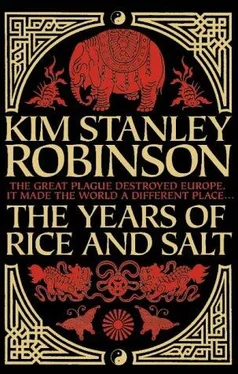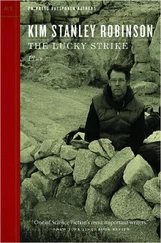Kim Robinson - The Years of Rice and Salt
Здесь есть возможность читать онлайн «Kim Robinson - The Years of Rice and Salt» весь текст электронной книги совершенно бесплатно (целиком полную версию без сокращений). В некоторых случаях можно слушать аудио, скачать через торрент в формате fb2 и присутствует краткое содержание. Год выпуска: 2003, ISBN: 2003, Издательство: Bantam Books, Жанр: Альтернативная история, на английском языке. Описание произведения, (предисловие) а так же отзывы посетителей доступны на портале библиотеки ЛибКат.
- Название:The Years of Rice and Salt
- Автор:
- Издательство:Bantam Books
- Жанр:
- Год:2003
- ISBN:0-553-10920-0
- Рейтинг книги:5 / 5. Голосов: 1
-
Избранное:Добавить в избранное
- Отзывы:
-
Ваша оценка:
- 100
- 1
- 2
- 3
- 4
- 5
The Years of Rice and Salt: краткое содержание, описание и аннотация
Предлагаем к чтению аннотацию, описание, краткое содержание или предисловие (зависит от того, что написал сам автор книги «The Years of Rice and Salt»). Если вы не нашли необходимую информацию о книге — напишите в комментариях, мы постараемся отыскать её.
The Years of Rice and Salt — читать онлайн бесплатно полную книгу (весь текст) целиком
Ниже представлен текст книги, разбитый по страницам. Система сохранения места последней прочитанной страницы, позволяет с удобством читать онлайн бесплатно книгу «The Years of Rice and Salt», без необходимости каждый раз заново искать на чём Вы остановились. Поставьте закладку, и сможете в любой момент перейти на страницу, на которой закончили чтение.
Интервал:
Закладка:
The admiral of the great fleet was on their ship: Zheng He, a giant of a man, a flat-faced western Chinese, a hui as some slaves called him under their breath. Because of his presence the upper deck was crowded with officers, dignitaries, priests, and supernumeraries of every sort. Belowdecks there were a lot of black men, Zanjis and Malays, doing the hardest work.
That night four men came into the slaves’ room. One was Hua Man, Zheng’s first officer. They stopped before Kyu and grabbed him up. Hua struck him on the head with a short club. The other three pulled off the boy’s robe and separated his legs. They tied bandages tightly around his thighs and around his waist. They held the semiconscious boy up, and Hua took a small curved knife from his sleeve. He grasped the boy’s penis and pulled it out, and with a single deft slice cut off penis and balls, right next to the body. The boy groaned as Hua squeezed the bleeding wound and slipped a leather thong around it. He leaned down and inserted a slender metal plug into the wound, then pulled the thong tight and tied it off. He went to the shithole and dropped the boy’s genitals through it into the sea. Then from one of his assistants he took a wet wad of paper and held it against the wound he had made, while the others bandaged it in place. When it was secured two of them put the boy’s arms over their shoulders, and walked him out the door.
They returned with him a watch or so later, and let him lie down. Apparently they had been walking him the whole time. “Don’t let him drink,” Hua said to the cowed slaves. “If he drinks or eats in the next three days, he’ll die.”
The boy moaned through the night. The other slaves moved instinctively to the other side of the room, too scared to talk about it yet. Bold, who had gelded quite a few horses in his time, went and sat by him. The boy was perhaps ten or twelve years old. His gray face had some quality that drew Bold, and he stayed by him. For three days the boy moaned for water, but Bold didn’t give him any.
On the night of the third day the eunuchs returned. “Now we see whether he will live or die,” Hua said. They held up the boy, took off the bandages, and with a swift jerk Hua pulled the plug from the boy’s wound. Kyu yelped and groaned as a hard stream of urine sprayed out of him into a porcelain chamber pot held in place by the second eunuch.
“Good,” Hua said to the silent slaves. “Keep him clean. Remind him to take out the plug to relieve himself, and to get it back in quick, until he heals.”
They left and locked the door.
Now the Abyssinian slaves would talk to the boy. “If you keep it clean it will heal right up. Urine cleans it too, so that’s all right, I mean, if you wet yourself when you go.”
“Lucky they didn’t do it to all of us.”
“Who says they won’t?”
“They don’t do it to men. Too many die of it. Only boys can sustain the loss.”
The next morning Bold led the boy to the shithole and helped him to get the bandage off, so he could pull the plug and pee again. Then Bold put it back for him, showing him where it went, trying to be delicate as the boy whimpered. “You have to have the plug, or the tube will close up and you’ll die.”
The boy lay on his cotton shift, feverish. The others tried not to look at the horrible wound, but it was hard not to see it once in a while.
“How could they do it?” one said in Arabic, when the boy was sleeping.
“They’re eunuchs themselves,” one of the Abyssinians said. “Hua is a eunuch. The admiral himself is a eunuch.”
“You’d think they’d be the ones to know.”
“They know and that’s why they do it. They hate us all. They rule the Chinese emperor, and they hate everyone else. You can see how it will be,” waving around at the immense ship. “They’ll castrate all of us. It’s the end coming.”
“You Christians like to say that, but so far it’s only been true for you.”
“God took us first to shorten our suffering. Your turn will come.”
“It’s not God I fear, but Admiral Zheng He, the Three Jewel Eunuch. He and the Yongle Emperor were friends when they were boys, and the emperor ordered him castrated when they were both thirteen. Can you believe it? Now the eunuchs do it to all the boys they take prisoner.”
In the days that followed Kyu got hotter and hotter, and was seldom conscious. Bold sat by his side and put wet rags in his mouth, reciting sutras in his mind. The last time he had seen his own son, almost thirty years before, the boy had been about this age. This one’s lips were gray and parched, his dark skin dull, and very dry and hot. Bold had never felt anyone that hot who had not died, so it was probably a waste of time for all concerned; best to let the poor sexless creature slip away, no doubt. But he kept giving him water anyway. He recalled the boy looking around the ship as they had loaded it, his gaze intense and searching. Now the body lay there looking like some sad little African girl, sick to death from an infection in her loins.
But the fever passed. Kyu ate more and more. Even when he was active again, however, he spoke little compared to before. His eyes were not the same either; they stared at people like a bird’s eyes do, as if they did not quite believe anything they saw. Bold realized that the boy had traveled out of his body, gone into the bardo and come back someone else. All different. That black boy was dead; this one started anew.
“What is your name now?” he asked him.
“Kyu,” the boy said, but unsurprised, as if he didn’t remember telling Bold before.
“Welcome to this life, Kyu.”
Sailing on the open ocean was a strange way to travel. The skies flew by overhead, but it never looked like they had moved anywhere. Bold tried to figure what a day’s ride was for the fleet, wondering if it was faster in the long run than horses, but he couldn’t do it. He could only watch the weather and wait.
Twenty-three days later the fleet sailed into Calicut, a city much bigger than any of the ports of Zanj, as big as Alexandria, or bigger.
Sandstone towers bulbed, walls crennellated,
All overgrown by a riot of greens.
This close to the sun life fountains into the sky.
Around the stone of the central districts,
Light wooden buildings fill the green bush
Up the coast in both directions,
Into the hills behind; the city extends
As far as the eye can see, up the sides
Of a mountain ringing the town.
Despite the city’s great size, all activity stopped at the arrival of the Chinese fleet. Bold and Kyu and the Ethiopians looked through their grating at the shouting crowds, all those people in their colors waving their arms overhead in awe.
“These Chinese will conquer the whole world.”
“Then the Mongols will conquer China,” Bold said.
He saw Kyu watching the throng on shore. The boy’s expression was that of a preta, unburied at death. Certain demon masks had that look, the old Bön look, like Bold’s father when enraged, staring into a person’s soul and saying I’m taking this along with me, you can’t stop me and you’d better not try. Bold shuddered to see such a face on a mere boy.
They were put to work unloading cargo into boats, and taking other loads out of boats onto the ship, but none of the slaves were sold, and only once were they taken ashore, to help break up a mass of cloth bolts and carry them to the long low dugouts being used to transfer goods from the beaches to the treasure fleet.
During this work Zheng He came ashore in his personal barge, which was painted, gilded, and encrusted with jewelry and porcelain mosaics, and had a gold statue facing forward from the bow. Zheng stepped down a walkway from the barge, wearing golden robes embroidered in red and blue. His men had laid a carpet strip on the beach for him to walk on, but he left it to come over and observe the loading of the new cargo. He was truly an immense man, tall, broad, and with a deep draft fore and aft. He had a broad face, not Han; and a eunuch; he was all the Abyssinians had claimed. Bold watched him out of the corner of his eye, and then noticed that Kyu was standing bolt upright staring at him too, work forgotten, eyes fixed like a hawk’s on a mouse. Bold grabbed the boy and hauled him back to work. “Come on, Kyu, we’re chained together here, move or I’ll knock you down and drag you across the ground. I don’t want to get in trouble here, Tara knows what happens to a slave in trouble with such people as these.”
Читать дальшеИнтервал:
Закладка:
Похожие книги на «The Years of Rice and Salt»
Представляем Вашему вниманию похожие книги на «The Years of Rice and Salt» списком для выбора. Мы отобрали схожую по названию и смыслу литературу в надежде предоставить читателям больше вариантов отыскать новые, интересные, ещё непрочитанные произведения.
Обсуждение, отзывы о книге «The Years of Rice and Salt» и просто собственные мнения читателей. Оставьте ваши комментарии, напишите, что Вы думаете о произведении, его смысле или главных героях. Укажите что конкретно понравилось, а что нет, и почему Вы так считаете.












